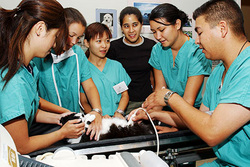Elementary and middle school
- Visit a farm or ranch
- Talk to your parents about camps that allow you to get up close and personal with farm animals
- Interview veterinarians about their jobs and what it takes to be a vet
- If you have a pet or are planning to get one, observe how it's body works. See it's reaction to a loud noise or a snack. Your pet, however, will tell you if it doesn't want to be observed. This does NOT mean that you should perform any procedure on your pet.
College
- Specialize in a scientific field. Fields related to biology or pre-medicine are a particularly good idea.
- Take courses in animal husbandry, livestock management and disease control.
- Get an internship job working at a rural clinic or some other job that lets you treat farm animals.
Veterinary school
University of Pennsylvania
Texas A&M University
- Vet school lasts for 4 years after college.
- These are some of the best large animal vet schools (click here to find others).
University of Pennsylvania
Texas A&M University
Residency
- Many new vets go work with an experienced vet for a year or more learning from them before trying to go out on their own.
- There are lots of areas of the country with not enough vets. But the amount of money you can make can be very different in different locations. Make sure you choose the right place for you.
- Each state has rules about taking extra classes each year so they can know about the latest things. Texas says vets have to take 17 hours each year.




